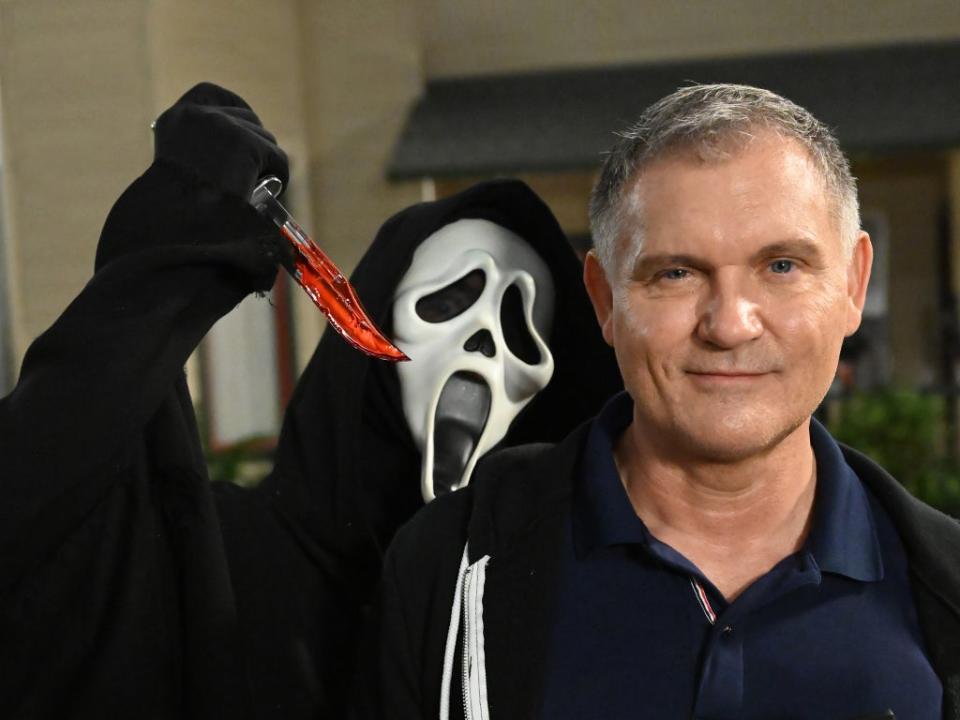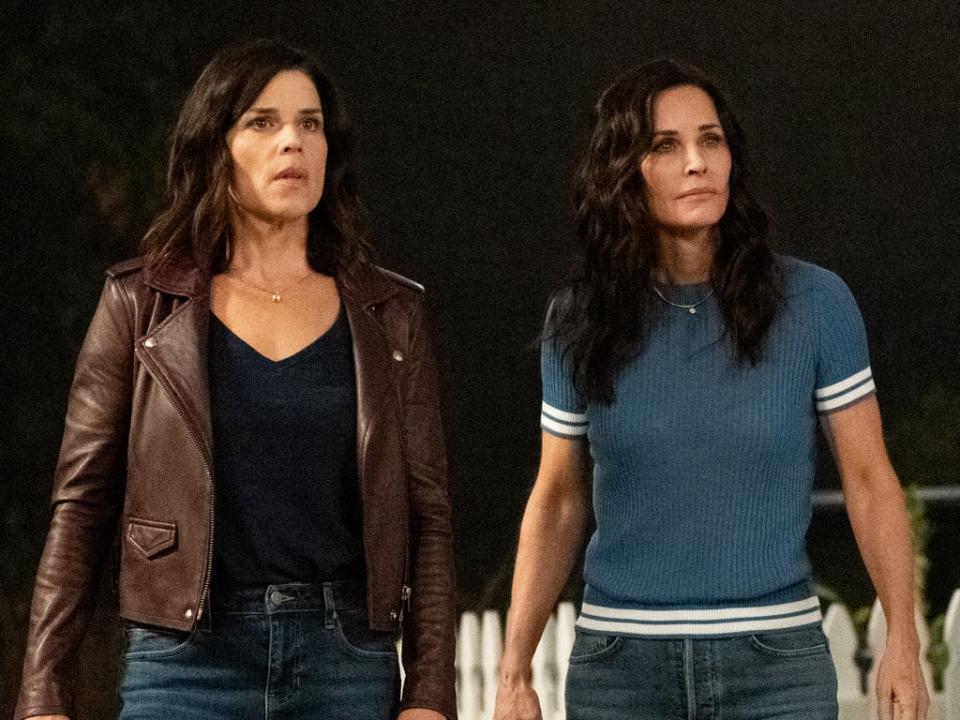Kevin Williamson: ‘The Scream movies are coded in gay survival’

By the end of the Nineties, everyone in American entertainment spoke like Kevin Williamson. Or maybe that’s because he was writing most of it. As the storyteller behind the Scream movies and Dawson’s Creek – as well as I Know What You Did Last Summer and, later, The Vampire Diaries – Williamson invented the post-modern teenager. His characters were neurotic, articulate and talked in film references, having been raised on a diet of Quentin Tarantino and Entertainment Weekly magazine.
“They were unique to their time,” Williamson says. “Scream was a new way of doing a horror film, a deconstruction. And everyone on Dawson’s Creek spoke like pop psychologists, but they were very much talking about real things. Despite the Nineties sheen it has, it also has a bunch of honesty. That was the magic of it.”
It’s also why they’ve lived forever. Scream turns 25 this month, and a fifth movie in the series – confusingly also titled Scream – is released in January. Dawson’s Creek is a Netflix hit, with star Joshua Jackson recently telling The Independent that he’s endlessly pestered by teenage fans who weren’t alive when it was actually being made. The recent TV reboot of I Know What You Did Last Summer only reminded people how much more fun the original is.
Williamson’s characters are often multi-faceted, deceptively complex and written with genuine care. Dawson’s Creek understood that teenagers can be incredibly stupid and cruel, but also wise beyond their years. The Scream films – at least those scripted by Williamson – resist traditional slasher-movie cannon fodder, instead driving home the tragedy of life being snatched away. Drew Barrymore and Jada Pinkett Smith appear in the respective opening scenes of Scream and Scream 2 only to die horribly, but Williamson gives both of their characters such personality that you feel sick when they kick the bucket. The ones we’ve followed for 25 years – including Neve Campbell’s tortured heroine Sidney Prescott and Courteney Cox’s ambitious reporter Gale Weathers – have grown and evolved, the weight of maturity and trauma on their shoulders.
Williamson is enjoying the renewed appreciation for his early work. Over the phone from Los Angeles, the 56-year-old speaks with the jovial manner of an old friend, catching up on the latest UK-US Covid protocols, and playfully dispensing off-the-record gossip. He calls himself a “late bloomer”, and that he didn’t intend to write about teenagers so often. “Venturing into Hollywood, I was in my second coming of age. Everything was new, everything was a first. I was experiencing first love at 29, and all of the emotions that young people feel. It just poured out of me.”
Characters and storylines in Dawson’s Creek were famously autobiographical, but what about Scream? Growing up, Williamson’s favourite movie was Halloween, which Scream is obviously indebted to, but he says that the plight of Sidney – a teenager with a murdered mother and a boyfriend who may be a psychopath – also took root in his own experiences. “One of the things I’ve wrestled with is trust, and Sidney trusted no one,” he explains. “Did she really know her mother? Is her boyfriend who he says he is? In the end she wasn’t even trusting herself.”
Sidney’s continued strength in the face of horror didn’t just make her the latest incarnation of the slasher movie “final girl” – aka the smart, virginal teenager who always managed to outsmart the killer – it also spoke to Williamson’s own sexuality. “As a gay kid, I related to the final girl and to her struggle because it’s what one has to do to survive as a young gay kid, too. You’re watching this girl survive the night and survive the trauma she’s enduring. Subconsciously, I think the Scream movies are coded in gay survival.” He adds, however, that their consistent casting of women beloved by gay men – such as Laurie Metcalf, Parker Posey, Sarah Michelle Gellar and Carrie Fisher – was more of a coincidence than some big queer conspiracy. “It just happened!” he laughs. “It’s a gay universe, I guess.”

In the wake of Scream, Williamson became a hot property, and one of the rare screenwriters to have their name positioned as prominently on movie posters as the actual stars. He calls himself a “10-year overnight success”, as he had drifted around Hollywood for a decade before anyone took notice of him. Once fame hit, though, he struggled. “It was really fast and I wasn’t ready for it. I was also scared that it was all going to go away.” He’d take on so many opportunities that he inevitably burned out. “There were two or three years there where I don’t think I slept. I never want to go back to that again.”
Meanwhile, the Scream movies had become a money-making machine for Bob Weinstein’s Dimension Films. The first Scream – with its cast of relative unknowns and a director, Wes Craven, then long past his smash hit A Nightmare on Elm Street – was shot without much incident. Production on the sequels was a different story, and came to be defined by speed and chaos.
“We had a wonderful time making Scream 2, but it was just fast,” Williamson remembers. “Scream 3 was a product of me being busy.” He was writing the script for Halloween H20, directing the dark comedy Teaching Mrs Tingle and running two TV shows, and was asked to somehow squeeze in another Scream. “[Dimension] wanted it yesterday. I told them, please, I think I’ll die if you make me write a new Scream. They didn’t want to wait.” He put together a 30-page plot outline, which was then developed by Craven and a different writer, Ehren Kruger. The resulting film was a critical disappointment and tonally all over the place. It put the series on ice.
“Scream 4…” Williamson sighs. “When you have a big successful franchise and money is on the line, it suddenly becomes a studio possession. They’re hands on, and it’s no longer your baby.” Made a decade after Scream 3, the fourth entry in the series was a slight return to form, but still had too many cooks in the kitchen. It was a difficult set, with Williamson’s script tampered with by numerous other parties, and Craven reportedly unhappy. He died in 2015, leaving Scream 4 his final movie. The motive of the film’s killer – a teenager so desperate for instant fame that they plot to usurp Sidney as America’s favourite “celebrity victim” – was Williamson’s. Much of the rest wasn’t.
It’s partly the reason why he didn’t want to be involved in a fifth one. When he and Craven had discussed a trilogy of new films, he tells me, “We were saying it’s maybe time to pass the baton, and have a younger, fresher writer who’s closer to a teenager write these stories.” So when a fifth Scream – to be co-written and directed by the team behind the 2019 thriller Ready or Not – became a reality, he balked. “I said no five times,” he laughs. “And then, finally, I woke up one day and said: ‘Um, can I be a part of it?’ I didn’t want it to happen without me.”
Williamson was greeted with massive enthusiasm by the film’s directors Matt Bettinelli-Olpin and Tyler Gillett – themselves enormous Scream fans – and hung out on set, meeting the cast and crew and offering advice whenever they needed it. He’s since seen the new movie “seven or eight times”. “I’m very critical,” he says, admitting that he was nervous about not liking it because “they were all wanting to know what I thought about it”. He loved it, though. “It’s really good and a lot of fun. If you like the first Scream, I think you’re gonna have a blast.”
He even got a little verklempt over some of it. “It’s astonishing – when Sidney Prescott shows up, you’re like aww.” It’s comforting to know that even Scream’s own creator can’t help but get nostalgic for Neve Campbell.
‘Scream’ is released in cinemas on 14 January
Read More
Joshua Jackson: ‘I think the process of not being a d*** is a lifelong one’
‘Torture the women!’: How horror’s final girls are turning the tables on misogyny
Scream queens: Remembering the short-lived queer villains of horror
Paolo Sorrentino: ‘I’m worried by scepticism about the wonderful aspects of life’

 Yahoo News
Yahoo News 